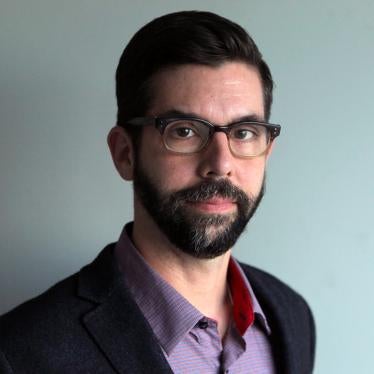The anti-Gadhafi movement, at first peaceful and then with arms, appears on the verge of toppling one of the world's more oppressive rulers, who crushed and controlled Libya for 42 years. Now there's a chance to build a more democratic state based on fundamental rights and the rule of law, which Libyans have lacked for too long.
Other repressive rulers in the Arab world and beyond must be having sleepless nights: Take note President Bashar al-Assad of Syria. The Libya that seemed forever frozen by Col. Moammar Gadhafi's violence and fear has now changed, and whether he falls today or some time soon the Middle East and North Africa won't be the same.
Daunting tasks face the transitional leadership, the National Transitional Council, in the days and weeks ahead, particularly in the area of human rights. How they tackle those challenges will set the tone in Libya for years to come.
First is the responsibility to avoid revenge. Fighters with the council should treat all of their detainees humanely, from members of the Gadhafi family to captured fighters on the streets. They should turn the page on the old regime's standard use of torture and abuse.
The council's forces should protect vulnerable sites that will be the focus of an emotional population with legitimate, pent-up grievances, such as police stations, courthouses, prisons and other symbols of the Gadhafi state. And forces should protect the vulnerable populations that could be attacked, including internally displaced people who fled areas of council control in eastern Libya and the western mountains, security officials who are blamed for helping Gadhafi maintain control and residents in Gadhafi strongholds such as Sebha and Sirte.
Dark-skinned Libyans and sub-Saharan Africans face particular risks because rebel forces and other armed groups have often considered them pro-Gadhafi mercenaries from other African countries. We've seen violent attacks and killings of these people in areas where the National Transitional Council took control.
Government arms depots also need securing to ensure that Gadhafi's vast military arsenal does not fall into private hands, fueling an insurgency and perhaps getting smuggled outside the country. In other parts of Libya, Human Rights Watch has seen large, unguarded depots with land mines, Grad rockets, anti-tank missiles and handheld SA-7 Grail surface-to-air missiles capable of shooting down a civilian airplane.
So far, the council's leadership has made admirable statements about these threats. They have made forceful speeches against reprisal violence and sent out mass SMS messages urging calm and the protection of state facilities. But the leaders will need to turn these strong words into concrete acts to avoid post-Gadhafi abuse. They will need to arrest and prosecute those who try to loot or take justice into their own hands.
There will be a long-term, herculean task of building democracy in a country that knew only one man and his idiosyncratic ideology for four decades. Libya has no independent courts. It lacks a free media. It has no constitution or separation of powers. The obstacles to building democratic institutions will be huge, and Libyans will need international support.
Justice is required, both for decades of repression and for six months of armed conflict. But arrests and prosecutions should proceed according to the rule of law, rather than with arbitrary arrests and show trials of those who supported, or are suspected of having supported, the regime.
Ultimately, some form of Libyan reconciliation process will probably be needed as the country grapples with the dictatorship and its network of support.
Divisions within the National Transitional Council will no doubt emerge as its members shift from their singular focus of toppling Gadhafi to the painstaking work of building something new. But if dialogue and transparency prevail, then Libya has a chance to become a much better place.
Fred Abrahams is a special adviser at Human Rights Watch.







